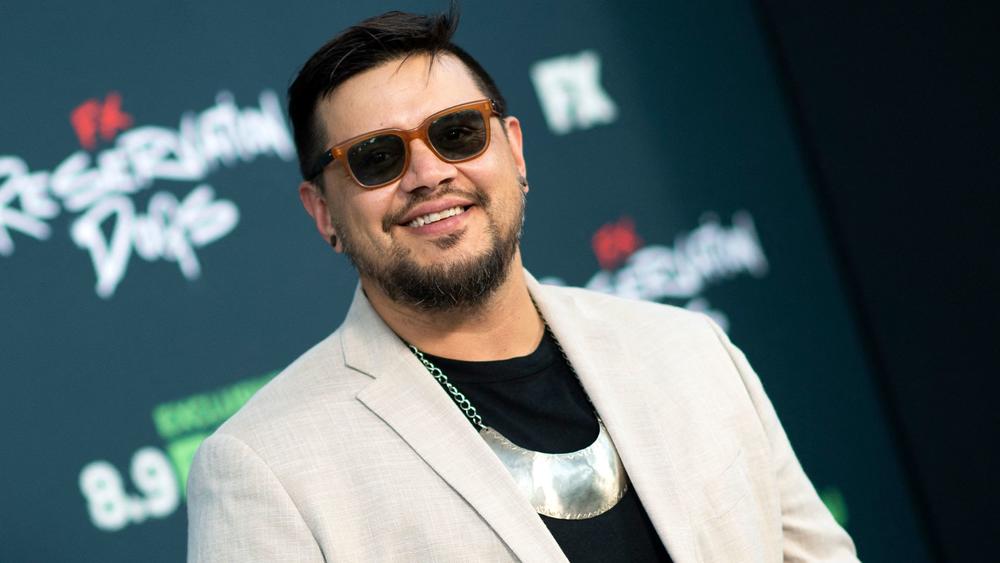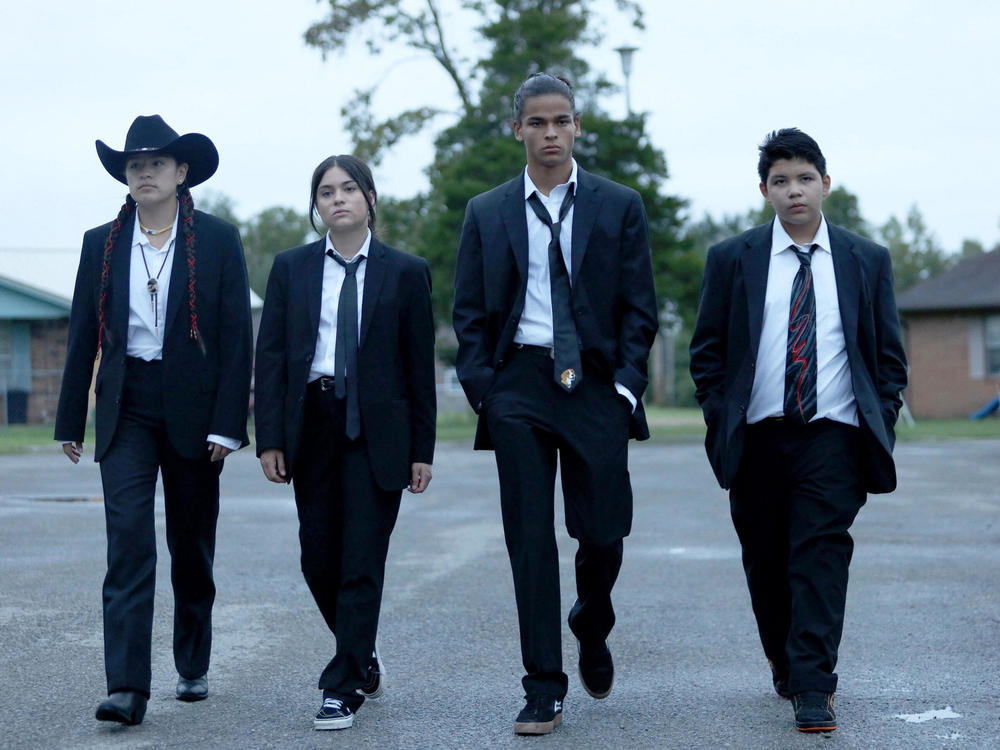Section Branding
Header Content
'Reservation Dogs' co-creator says the show gives audiences permission to laugh
Primary Content
Reservations Dogs co-creator and showrunner Sterlin Harjo says he grew up surrounded by the "best storytellers in the world."
Harjo remembers sitting in his grandmother's kitchen as a kid, listening to tales of amazing characters — either real or imagined — often doing mundane or ordinary things. The magic was in the telling; a story about someone making a simple run to the store could be infused with sadness and regret, coincidence and magic.
"That's how I learned to tell stories. ... You can't say that cinema is a Native American art form, but storytelling is, " Harjo says. "I try to capture just a small amount of that in [Reservation Dogs]."
Reservation Dogs is the first and only TV series where every writer, director and series regular is Indigenous. Part comedy and part drama, the FX series streaming on Hulu follows four teenagers who long to escape the dead ends they face living on a reservation. They're frustrated and alienated, caught between what's left of traditional Native culture on the reservation and the broader pop culture. The show highlights the importance of Native traditions — while also mocking how tradition can be turned into sanctimonious pop culture clichés.
Harjo belongs to the Seminole and Muscogee Nations, and he says the positive feedback from his community — including his parents — is what keeps him going: "My dad, one day, said to me, 'This show has given people, Native people, a reason to hold their heads up a little higher.'"
Last Halloween, Harjo noticed something he hadn't seen before: "Every year at Halloween, there's people that dress up in these fake, dime-store Indian clothing. And they are 'Indian' for Halloween. And we've all seen that growing up. We've all seen it. And my kids are going to have to see it. But all of a sudden, after Season 1, people, kids started dressing up as the Reservation Dogs. So many pictures flooded in on social media of them dressed as the Reservation Dogs."
Interview highlights
On why he prefers the term "Indian" to "Native American"
My grandma said "Indian," so I'm not here to change what my grandma said. And it's what I know. I'm sorry that Christopher Columbus got it wrong, but that's what we call ourselves, you know? That's what we call ourselves. I also say "Native" and I say "Indigenous." Just depending on where I'm at and who I'm talking to, those are all interchangeable to me. "Native American" is just a mouthful.
On the show's name Reservation Dogs title paying homage to Quentin Tarantino's Reservoir Dogs
It came out when I was in college, and it was right as I discovered that I could be a filmmaker. ... My father had a friend who worked for the cable company, and that's the only way that we got cable. So I was able to watch movies for free because his friend did some backdoor stuff and hooked us up with a cable box that allowed us to watch HBO and Showtime. I just became immersed in movies and pop culture. MTV was out at the time. I think that when you're from a rural community, that's kind of how you live your life. You almost live your life through movies and through pop culture. ... First of all, it's a catchy title, not a lie, Taika [Waititi] and I came up with it. And then it was, well, if we're going to have this show where these kids are living through and constantly referencing pop culture, like we have to tip our hat to the master of that.
On playing with the stereotypical "Indian warrior" imagery in the pilot
Most of the time people are very precious with Native people, like, "This is no laughing matter." This is very serious and stoic, and that's kind of how the world is trained to view us. We realize we need to bake into the show permission to laugh with us.
And I think that that spirit character, he comes in at this moment in the pilot. ... If I asked most people in the world to draw a Native American, that's what they would draw. They would draw an Indian that was dressed in buckskins from the 1800s. They wouldn't draw me. They wouldn't draw any of the characters on the show. So it was almost like giving people some familiar territory and then turning it on its head.
On growing up on the Muscogee Reservation in Oklahoma
Right now I live on the Muscogee Reservation, which is part of Tulsa. Through a lot of complicated government policy and interactions with tribal governments that I can't go into because it'd be another show, it was not identified as a reservation before, but it is now. But if you look at Oklahoma, it used to be Indian Territory, which was essentially one big reservation. Then, of course, oil and the land and other things disrupted that.
But this is where Trail of Tears ended. This is where all of the tribes that were forcibly removed by the U.S. government were brought to Indian Territory, which is Oklahoma now. So essentially it was one giant reservation. And you go an hour in any direction in Oklahoma or 30 minutes in any direction, in Oklahoma, you're going to be in a new tribal territory, with different tribal languages on the stop signs and on signage in the town. Different cultures, different customs. And so it's ... a melting pot of Indigenous Native people from America. And I think there's something like 38 tribes here.
So you grow up different when you're in Oklahoma as a Native kid. ... People know Native culture, people know who Native people are. And it's a very diverse state. I think that not a lot of people know about Oklahoma and the diversity here, but in rural Oklahoma, it's very diverse. And I don't know, it was something that I wanted to celebrate in the show, growing up in Indian Territory, Oklahoma.
On why Native teens connected to rap music when he was coming of age
Rap was reaching the height of popularity ... and being a Native kid, we gravitated towards it because it was the sort of punk rock that we were growing up with. It gave Native kids a culture and identity that they could grab a hold of at a time where our own identity was a bit lost and our own identity was less celebrated, we could grab a hold of hip-hop, and that became something that we could identify with that was taking it to the man that was exposing problems within our culture. I think that it became something that, as a term, as a means of endearment to us, that it helped us in our own identity and in our own struggle.
On the importance of ghosts and spirits in his culture – and in his work
I think that part of growing up and with Muscogee and Seminole culture is death is such a part of our experience. It's very community-driven. Your cousins are like your brothers and sisters. Your aunts are your extended parents, and you're close to your elders and everyone's a part of this tight community.
I was constantly at funerals. I've been a pallbearer, like, 12 to 15 times, I think, give or take. And our songs, the songs that we sing, there's these spiritual songs that we sing that mostly get sung and you hear them at funerals, and it's all about facing death and mortality head on. There's something really beautiful about a funeral in our community, where everyone comes together and it's really funny. And you're getting to see people that you haven't seen in a long time and you say, "I love you," to people that you wouldn't normally say, "I love you" to. It's just a part of being in a community.
Someone was always passing away. ... In the culture you're taught that they're not gone and that you can still speak to them and talk to them and there's ghost stories and things like that. But I just grew up with this sense of magic, and there's a sense of like we can communicate, we can reach people in other places, and there's ceremonies for it and there's different things. It's something that I'm fascinated with ... and I explore it as much as I can through my work.
On the casting process for Reservation Dogs
You can't go to Hollywood to cast a show like this. ... [Native actors usually] get to play, like, a dead Indian outside of a teepee every five to 10 years, you know? So there's not a big pool of Native actors in L.A. So we went to the communities, and shout out to Angelique Midthunder, who was our casting director. She went in and we went to different communities and we also had tapes sent to us from communities, but it was important that they were from an Indigenous community. ... It wasn't unnecessarily unorthodox for me, because I've been making these films for so long, and I know that there's talent out there. There's just not opportunities for Native actors to even know that there's an opportunity to be in a movie.
On seeing Indian stereotypes in pop culture as a kid
My dad watched Westerns. ... There was a way to sort of separate what was happening in the Western for me, because I didn't recognize the Indians in the Western. They weren't my experience. When you grow up and your grandma and your mom and your dad and everyone's Native around you, and then you see this version of Native people in these Westerns that are just the bad guys that are faceless and sort of like the zombies. ... They're in the way and the white man has to exterminate them for Western expansion purposes and to tame the West or whatever, I don't recognize that as my people. So it wasn't painful to watch for me. I could separate it. I do see the issues in that now I have to explain to my kids why they can't watch Peter Pan, and if there was a Western on, I would have to explain to them, like everything all of a sudden becomes a lecture, where I'm having to talk about film analysis with my children. It has an effect.
On absolving himself of the guilt that he can't speak Muscogee
For a long time, I felt really guilty about that. ... But at a certain point, I just came to the realization that government policy, genocide, colonization, ... the forced removal by Andrew Jackson. So many things caused that. And I let go of that sense of guilt, because it's all been about survival and there's things that were taken away and there's things that perish because of that. And all I can do is try to learn and realize that it's not my fault, it came before me. The darkness that can take a language away, came before me. And you look at boarding schools ... and how they actively took away our language. My parents and grandparents went to these boarding schools, so the fact that we have any of it left is a miracle. So I try to really focus on that: the miracle of it, the magic of the fact that we still have our culture and it is about survival. I try to focus on that instead of the guilt that I think you grow up with when you can't speak the language.
Lauren Krenzel and Susan Nyakundi produced and edited this interview for broadcast. Bridget Bentz, Molly Seavy-Nesper and Beth Novey adapted it for the web.
Copyright 2022 Fresh Air. To see more, visit Fresh Air.
Bottom Content





